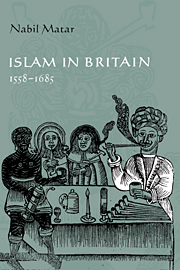Book contents
- Frontmatter
- Contents
- Acknowledgments
- Transcription
- Introduction: Islam in early modern Britain
- 1 “Turning Turke”: conversion to Islam in English writings
- 2 The renegade on stage and in church
- 3 “Arabia Britannica”: “Alcoran” and the legacy of Arabic Islam
- 4 “Baptizing the Turk”: conversion to Christianity in English writings
- 5 Eschatology and the Saracens
- Conclusion: Islam and Britain: centripetal to centrifugal
- Bibliography
- Index
5 - Eschatology and the Saracens
Published online by Cambridge University Press: 27 October 2009
- Frontmatter
- Contents
- Acknowledgments
- Transcription
- Introduction: Islam in early modern Britain
- 1 “Turning Turke”: conversion to Islam in English writings
- 2 The renegade on stage and in church
- 3 “Arabia Britannica”: “Alcoran” and the legacy of Arabic Islam
- 4 “Baptizing the Turk”: conversion to Christianity in English writings
- 5 Eschatology and the Saracens
- Conclusion: Islam and Britain: centripetal to centrifugal
- Bibliography
- Index
Summary
“The children of Isaac shall at last overcome them [the Arabs],” Nathaniel Homes, The Revelation Revealed (1654).
From the early sixteenth century through the Counter-Reformation and until the end of the Thirty Years War, Protestant writers confronted the military and political power of Catholicism. Simultaneously, there also loomed before them the Ottoman danger as the armies and navies of Islam pushed through Central Europe and attacked Mediterranean outposts such as Malta, Cyprus and Rhodes. In this context of dual confrontation, English and Scottish writers turned to eschatology – a genre of religious discourse which examined contemporary and future events in the light of Christ's Second Coming as propounded chiefly in the books of Daniel and Revelation.
Eschatology had been used in anti-Islamic polemic since the Middle Ages, but during the Reformation, it became widely prominent among both theologians and preachers. With its emphasis on the imminent return of Jesus, eschatology enabled communities within the Reformation movement to affirm their unique role in the fulfillment of God's design in history – when God would raise His elect to glory and destroy their enemies. Particularly in the exegesis of Martin Luther, the figure of the Turk became associated with the Papal enemy of God – both of whom were identified with the “Little horn” in the Book of Daniel and the “Beast” in Revelation. For Luther, the eschatological kingdom of Christ was to prevail after the destruction of the Catholic and the “Mahometan” adversaries.
- Type
- Chapter
- Information
- Islam in Britain, 1558–1685 , pp. 153 - 183Publisher: Cambridge University PressPrint publication year: 1998
- 3
- Cited by



